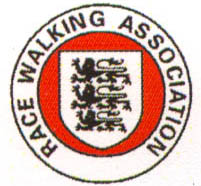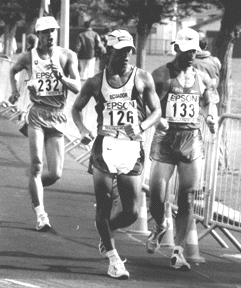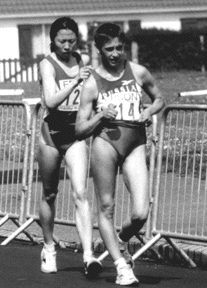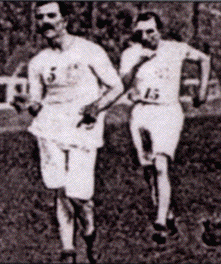
FOUNDED 1907
SOME FREQUENTLY ASKED QUESTIONS
|
THE
RACE WALKING ASSOCIATION
 FOUNDED 1907 SOME FREQUENTLY ASKED QUESTIONS |
What is Race
Walking?
Why not simply
run?
What are the rules?
What is the history of race walking?
How do you know when
they're
walking?
Is a walker told when he gets a warning?
Can a judge advise a
walker?
Isn't it
difficult for a beginner to learn straightening and contact at
the same time?
Are there
many race walkers?
What are
the distances of the races?
Are there
races for older people?
Are there races for younger people?
Where can I find out about competition for Young
Athletes?
How
good
do you have to be?
Where can I see some recent results?
What
about
power walking and speed walking?
Is it an expensive sport?
Don't you get laughed at?
What does it look like?
Is
race
walking a dying sport?
Is
it worth starting?
I have to take medication; am I in danger of being
banned?
How do I
find out more?
Where can I
read about race
walking?
....AND SOME ANSWERS....
What is Race Walking?
Race Walking
is a discipline or activity of athletics on a par with running,
jumping and throwing. There are race walking events in all the
major competitions - Olympic Games, World Championships, Continental
Championships, Commonwealth Games, etc. - and there are also World
and Continental Cups and Championships devoted entirely to race
walking. It is governed by Rule 230 of the International Association
of Athletics Federations. For the wording of the Rule, click
here
Why not simply run?
Running
is certainly faster, but one of the interests of sport is in achieving
good performances within the restriction of the rules. Swimming,
for example is fastest using the crawl stroke, but swimmers still
race using the backstroke, gaining possession at basketball would
be easier if you were allowed to tackle the opposition and progress
at rugby would be easier if you were allowed to pass the ball
forward; all these are examples of the imposition of rules to
make the game more interesting and challenging. Perhaps, though,
it would be better to regard race walking not as trying to go
as fast as possible and then restricting the way of doing so;
it should be seen as extending as far as possible one method of
progress without lapsing into another. The definitions and rules
of race walking are directed towards helping the extension and
preventing the lapsing. Surrey
Walking Club
provide an extensive answer to the question "Why Walk?"
What are the rules?
The basic
Rule of Race Walking is Rule 230.1 of the International Association
of Athletic Federations (the I.A.A.F.), which states:
Race Walking is a progression of steps so taken that the walker
makes contact with the ground, so that no visible (to the human
eye) loss of contact occurs. The advancing leg shall be straightened
(i.e. not bent at the knee) from the moment of first contact with
the ground until the vertical upright position. [ Full
text of
Rule 230.]
What is the history
of race walking?
For a potted history of the sport, click
here
How do you know that they're walking?
Judges
are appointed for each race to ensure that the competitors are
complying with Rule 230.1. If a judge thinks that any competitor
is not complying, that judge
will issue a "red card", which is passed
to the Chief Judge. This is posted on a board where the competitor
can see it. When a competitor receives a third red card, he will
be disqualified by the Chief Judge. No judge can issue more than
one red card against any individual competitor. In international
events, the three red cards against a competitor will generally have
to be issued by judges of three different nationalities; this
is to avoid any accusations of national bias.
Is a walker told when he gets a red card?
The judge
is not allowed to tell the walker when he issues a red card against
him. If the walker knew which judge had recommended
his disqualification he could, if he wanted to cheat, run past
that judge and no action could be taken; it is better for a walker
to know that he has red cards against him but not where they came
from.
Can a judge advise a walker?
A judge
must warn competitors "when, by their mode of progression,
they are in danger of failing to comply...."
No competitor is entitled to more than one warning from any judge
for being in danger of failing to comply for either loss of contact
or bent knees. Note that this Rule does not allow a judge
to warn a defaulting walker in the hope that he will become "legal".
If he is not complying he must be given a red card.
Isn't it difficult for a beginner to learn straightening
and contact at the same time?
A bit.
Within the R.W.A. territory (England, the Isle of Man and the
Channel Islands) there is an introductory type of race walking
designed to help beginners, in which the "straightening"
part of the Rule is not applied; only continuous contact is required.
Walks held strictly according to the I.A.A.F. Rule are called
"Category A" and those designed for the encouragement
of novice walkers are called "Category B"; in the Fixture List the Category of each
event is shown. All International events and all National, Area
and County Championships must be Category A; for other
events, the promoter may decide on the Category.
Are there many race walkers?
A count
suggests that in the R.W.A. territory rather more than 4,300 people
competed in race walking events in 2011-2012. However, this figure
is based upon the number of entries in "open" races;
there will have been many others competing in closed events, veterans'
leagues etc., who will not have been included in the count. Race
walkers
are spread across the territory, although there are particular
concentrations in South Yorkshire, Humberside, Merseyside, Lancashire,
the Midlands, Essex, Kent, Surrey, Sussex, Guernsey and the Isle
of Man; a development programme is under way to build the numbers
of walkers elsewhere.
What are the distances of the races?
From 1
mile up to 100 miles are the most common distances; there are
occasional events over greater distances. The standard international
distances (as in the Olympic Games) are 20 and 50 kilometres for
men and 20 kilometres for women. Younger walkers generally race
over shorter distances up to 10 kilometres.
Are there races for older people?
It is
possible to continue in competitive race walking well into the
sixties and seventies and even beyond; there are several very
active veterans' clubs (for men over 40 and women over 35), with
their own regional, national and international championships.
In addition, many veterans more than hold their own against much
younger walkers. If you wish to make contact with your local Veterans'
Club, click here.
Are there races for younger people?
Certainly.
The youngest "proper" age group is Under 13 (that is,
roughly speaking, 11 years old but not yet 13); others are Under
15, Under 17 and Junior (Under 20). All these age groups have
their own National, Area and, in some places, County Championships
and there are international opportunities. The R.W.A. organises a
year-long Younger Athletes' Grand Prix Series [see the next question].
There are also The English
Schools Athletic Association Championships. Special development races are
also
provided for Under 11s at certain events, where the officials
do all they can to encourage the young aspirants without having
to disqualify them.
Where
can I find out
about competition for young athletes? How good do you have to be? Where
can I see some
recent results? What about power walking and speed walking? Is it an expensive sport? Don't you get laughed at?
Is race walking a
dying sport? Is it
worth starting? SOME TOP MEN 232 Korcok (Slovakia): 126 Pérez
(Ecuador): SOME TOP WOMEN 122: Liu
(China): 214 Ryashkina (Russia)
Many events have races for younger
athletes and these are shown in the Fixture
Lists. The Grand Prix
mentioned above has its own web site, which you can visit here.
You don't
have to be a world-beater to enjoy race walking; 5 m.p.h. would
be a good sort of speed to aim at initially. It's roughly
true to say that running a mile is about the equivalent
of walking a kilometre, so that running 10 miles in 60 minutes
is roughly on a par with walking 10 kilometres in 60 minutes. See the question for information
on race times.
There is an excellent web site at RaceWalkUk, which has results of
races, athlete and club profiles, event entry information and much
else. Access is unrestricted and you are welcome to browse.
Power
walking and speed walking are milder and non-competitive variants
of race walking, just as jogging is a milder form of running.
Anyone who has done some power walking or speed walking is well
on the way to becoming a race walker; the difference is mostly
in degree of effort, with some more concentration on technique.
No. A
decent pair of shoes for a beginner would be the most expensive
item; you might hope to find them from £50 upwards. Sensible
clothing is reasonably cheap. Membership of a Club could cost
£20-£30 a year and most race entry fees are in the
range £4-£8.
It can't
be denied that there are some idiots (usually overweight people
in cars) who think that race walking looks funny. Don't take them
on unless you're a judo expert or a lawyer; they're usually driving
too fast for you to catch them, anyway. If other "athletes"
mock, invite them to try it; remember to show proper sympathy
when they collapse after fifty yards.
There are
some who think so; even some inside the sport – who should know better
– seem to have developed a sort of death-wish on the subject. Now, it
is quite true that numbers are not as high as they were thirty years
ago and the "When I was a lad...." brigade are always happy to report
in doom-laden terms how the performances that brought them home in
127th place in some race or other would nowadays win them a medal. As
often as not, investigation reveals that their memories are
wearing rose-tinted spectacles; either the field wasn't quite as big as
their recollection tells them, or they weren't quite as sharp as they reckon.
There was certainly a low point ten or twelve years ago, but annual
counts of participants show a slow and unspectacular but steady rise.
Internationally, it continues to grow; at the 2008 Olympic Games, 30
countries were represented in the women's 20k walk (as against, for
example, 22 in the women's shot put and 18 in the women's
10,000m), so walking is well up. Don't believe the Moaning Minnies;
race walking is on the up again!
It follows
from our previous answer that
there are likely to be more
race walkers next year than there are this, so the answer is "Yes." As
the numbers of participants, although rising, are still small it also follows
that if you are good you are liable to have more success than in
running – or, indeed, most other sports; in particular, team medals,
although not given away for nothing, are more easily come by. New
walkers with real talent will rapidly rise to the top; Johanna Jackson,
the current British No.1, has gone from being a very decent
cross-country runner to 22nd in the 2008 Olympic Games and first in the
Commonwealth Games. You never know how
you might flourish as a race walker – and you'll certainly be healthier.

133 García (Spain)

ONCE UPON A TIME, LIKE THIS [OLYMPIC GAMES, LONDON, 1908]

I have to take medication; am I in danger of
being banned?
How
do I find out more?
Ask for our free Introductory Pack, by
clicking here.
Where can I read about race walking?
The Race
Walking Association has a monthly magazine called Race
Walking Record and there is a
page of this site dedicated to Books about
Walking.

You are in the page shaded below, or one of its sub-pages
About
this Site
Archives
& Records
Books
F.A.Qs
Fixtures
Guide
Lighter
Side
Links
More
Info
Officers
Outside
Contacts
Quick
Index
Race
Walking
Record
Topical
Links
Venues
Services
Home